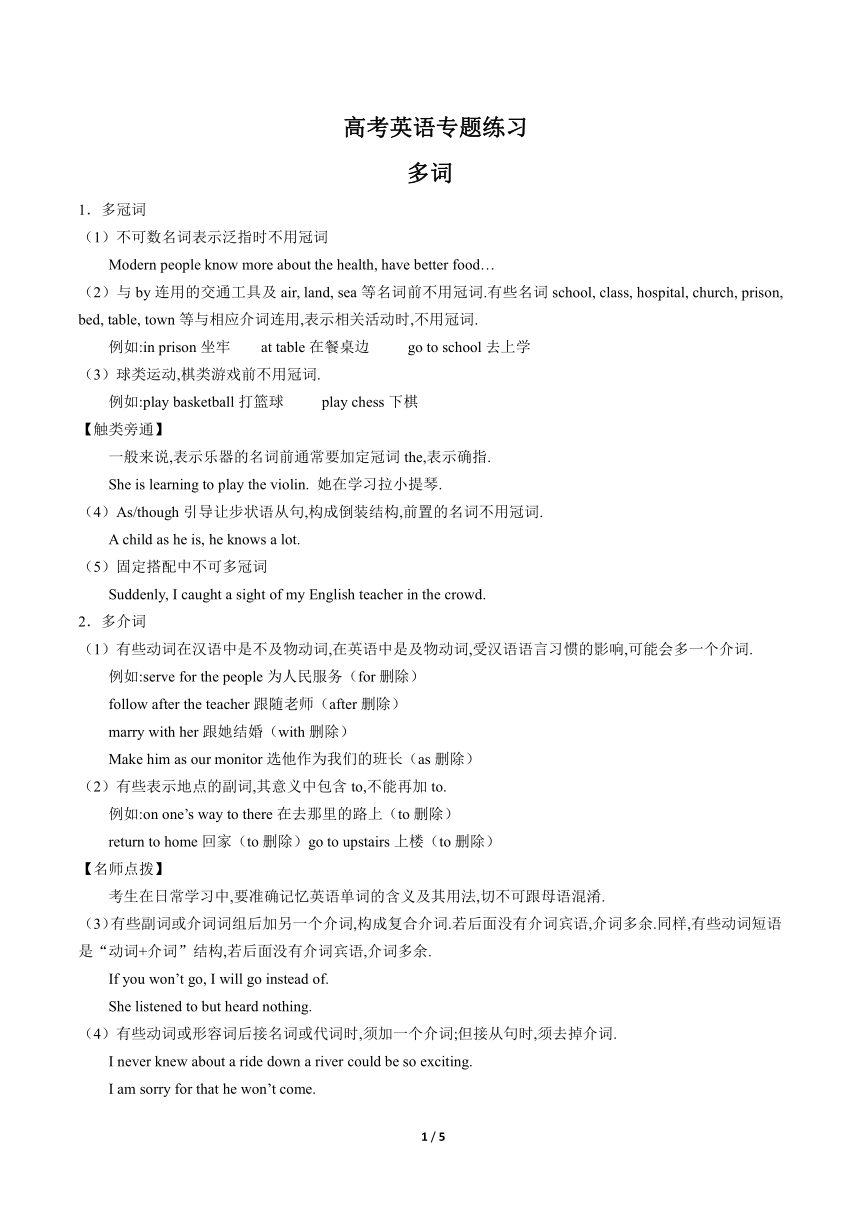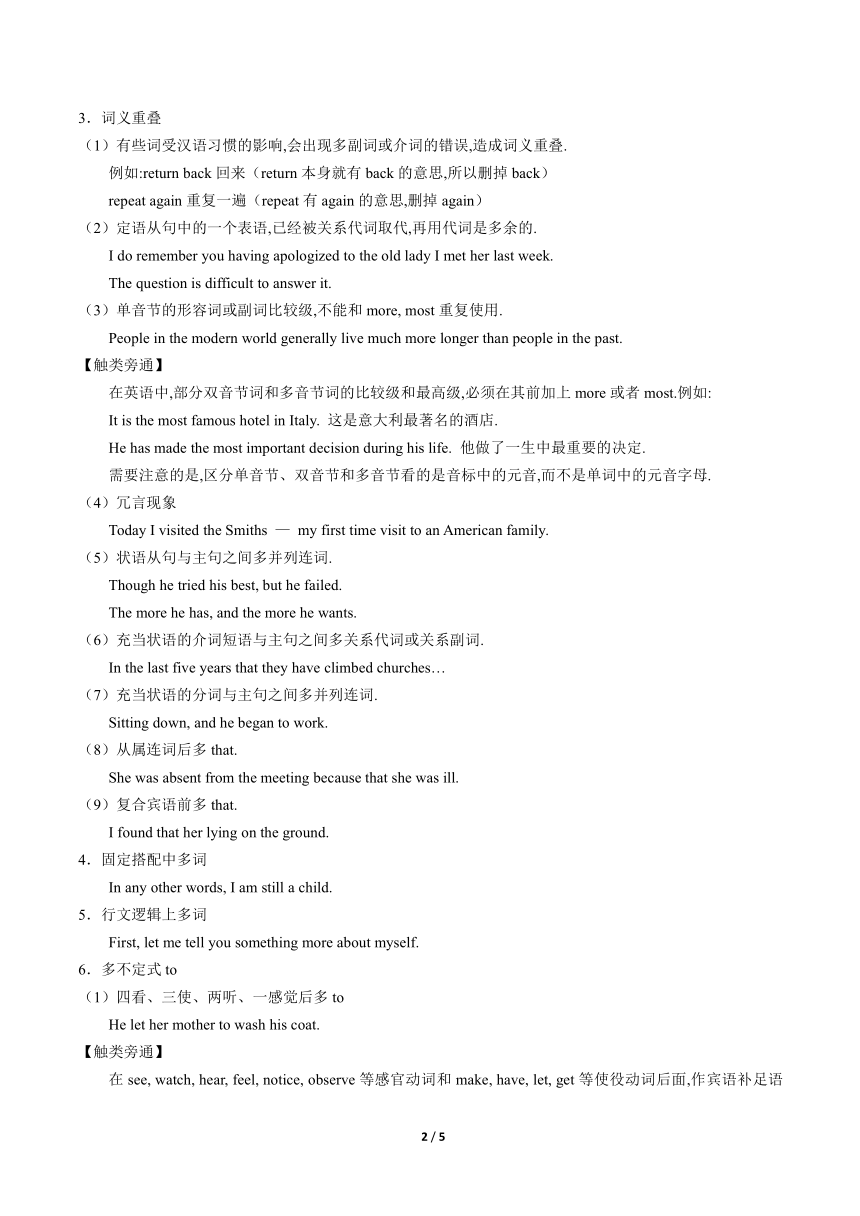高考英语-多词-专题练习(含答案)
图片预览


文档简介
高考英语专题练习
多词
1.多冠词
(1)不可数名词表示泛指时不用冠词
Modern people know more about the health, have better food…
(2)与by连用的交通工具及air, land, sea等名词前不用冠词.有些名词school, class, hospital, church, prison, bed, table, town等与相应介词连用,表示相关活动时,不用冠词.
例如:in prison坐牢 at table在餐桌边 go to school去上学
(3)球类运动,棋类游戏前不用冠词.
例如:play basketball打篮球 play chess下棋
【触类旁通】
一般来说,表示乐器的名词前通常要加定冠词the,表示确指.
She is learning to play the violin. 她在学习拉小提琴.
(4)As/though引导让步状语从句,构成倒装结构,前置的名词不用冠词.
A child as he is, he knows a lot.
(5)固定搭配中不可多冠词
Suddenly, I caught a sight of my English teacher in the crowd.
2.多介词
(1)有些动词在汉语中是不及物动词,在英语中是及物动词,受汉语语言习惯的影响,可能会多一个介词.
例如:serve for the people为人民服务(for删除)
follow after the teacher跟随老师(after删除)
marry with her跟她结婚(with删除)
Make him as our monitor选他作为我们的班长(as删除)
(2)有些表示地点的副词,其意义中包含to,不能再加to.
例如:on one’s way to there在去那里的路上(to删除)
return to home回家(to删除)go to upstairs上楼(to删除)
【名师点拨】
考生在日常学习中,要准确记忆英语单词的含义及其用法,切不可跟母语混淆.
(3)有些副词或介词词组后加另一个介词,构成复合介词.若后面没有介词宾语,介词多余.同样,有些动词短语是“动词+介词”结构,若后面没有介词宾语,介词多余.
If you won’t go, I will go instead of.
She listened to but heard nothing.
(4)有些动词或形容词后接名词或代词时,须加一个介词;但接从句时,须去掉介词.
I never knew about a ride down a river could be so exciting.
I am sorry for that he won’t come.
3.词义重叠
(1)有些词受汉语习惯的影响,会出现多副词或介词的错误,造成词义重叠.
例如:return back回来(return本身就有back的意思,所以删掉back)
repeat again重复一遍(repeat有again的意思,删掉again)
(2)定语从句中的一个表语,已经被关系代词取代,再用代词是多余的.
I do remember you having apologized to the old lady I met her last week.
The question is difficult to answer it.
(3)单音节的形容词或副词比较级,不能和more, most重复使用.
People in the modern world generally live much more longer than people in the past.
【触类旁通】
在英语中,部分双音节词和多音节词的比较级和最高级,必须在其前加上more或者most.例如:
It is the most famous hotel in Italy. 这是意大利最著名的酒店.
He has made the most important decision during his life. 他做了一生中最重要的决定.
需要注意的是,区分单音节、双音节和多音节看的是音标中的元音,而不是单词中的元音字母.
(4)冗言现象
Today I visited the Smiths — my first time visit to an American family.
(5)状语从句与主句之间多并列连词.
Though he tried his best, but he failed.
The more he has, and the more he wants.
(6)充当状语的介词短语与主句之间多关系代词或关系副词.
In the last five years that they have climbed churches…
(7)充当状语的分词与主句之间多并列连词.
Sitting down, and he began to work.
(8)从属连词后多that.
She was absent from the meeting because that she was ill.
(9)复合宾语前多that.
I found that her lying on the ground.
4.固定搭配中多词
In any other words, I am still a child.
5.行文逻辑上多词
First, let me tell you something more about myself.
6.多不定式to
(1)四看、三使、两听、一感觉后多to
He let her mother to wash his coat.
【触类旁通】
在see, watch, hear, feel, notice, observe等感官动词和make, have, let, get等使役动词后面,作宾语补足语的不定式不带to.但是在被动语态中,不定式的to要还原.需要注意的是,let没有被动语态.
We heard Tim sing an English song.
hear在这里表示主动听这个动作,所以省略to.
Tim was heard to sing an English song.
这句话中Tim是主语,是被动听,谓语动词用be heard,这种情况下不定式符号to要还原.
(2)why not后多to
Why not to borrow more money from your father-in-law?
(3)“除了……以外”后多to
We did nothing but to wait for him yesterday.
二、解题技巧与方法总结
多词在短文改错题中通常占1~2小题.改错时,首先要通读全文,在理解整篇文章的前提下逐句分析,一看意思是否正确,二看句子结构是否完整,是否有多词现象存在.尤其是:
1.名词前是否多了冠词,可数名词的单数形式要尤其注意;
2.动词不定式是否多了不定式符号to,动词原形要尤其注意;
3.及物动词或不及物动词后是否多了介词或副词;
4.根据句子的含义和句子结构以及上下文的逻辑关系,是否多了连词、代词等.
多词在短文改错中占的比重虽然不是很大,但是也需要引起我们的重视,考生应该加强针对性练习,不断总结经验教训,掌握此类题型的解题方法.
三、针对性训练
1.No computers so far having built can have the same ability as human brains.
2.Having worn out after a long walk, Helen called and said that she couldn’t come to the party.
3.I hope that both you two could come and visit us sometime soon.
4.I’ll spend all the whole weekend reading and preparing for it.
5.Whenever I see them, I will often think of my English teacher.
6.Most people can quickly get for help from a doctor or go to a hospital when they are ill.
7.Can you tell me about what I should do?
8.I was so tired that I fell asleep at the moment my head touched the pillow.
9.Farther in the distance, I could not enjoy the view of snowy mountains.
10.We do not seem to get much time to talk about together. 3 / 3
高考英语专题练习
多词
答 案
1.(1)删除the
(4)删除A, child首字母改为大写
(5)删掉a
2.(3)删掉of
删掉to
(4)about删掉
删掉for
3.(2)删掉her
删掉it
(3)删掉more
(4)time删掉
(5)删掉but
删掉and
(6)删掉that
(7)删掉and
(8)删掉that
(9)删掉that
4.删掉any
5.删掉more
6.(1)删掉to
(2)删掉to
(3)删掉to
三、针对性训练
1.去掉having
2.去掉Having, worn中的w改为大写
3.去掉both
4.去掉all
5.去掉often
6.去掉for
7.删掉about
8.去掉at
9.去掉not
10.去掉about或者在about后加it
高考英语专题练习
多词
解 析
1.(1)health在这里是泛指,不用冠词.
(4)句子为倒装句,名词前置不用冠词.
(5)catch sight of为固定搭配,意思是“看到,瞥见”.
2.(3)of后边没有跟宾语,所以删掉of。
to后边没有跟介词宾语,所以删掉to.
(4)know后接的是宾语从句,不需要跟介词about.
sorry后接的是宾语从句,删掉介词for.
3.(2)句子省略了关系代词that, that指代的是met的宾语her,所以应该删掉her.
The question is difficult to answer it.
不定式作定语后多了代词it,所以删掉it。
(3)longer是比较级,much修饰longer, more多余,故删掉.
(4)my first, second…visit to意思是“我第一次,第二次……拜访”,time多余,故删掉.
(5)在英语中,though和but不能同时出现在同一个句子中,所以删掉but.
the more…the more…意思是“越……越……”,之间不再使用and进行连接.
(6)介词短语In the last five years和主句they have climbed churches之间多了关系代词that,故删掉.
(7)sitting down在句中做状语,与主句之间不是并列关系,不需要增加表示并列的连词and。
(8)because引导原因状语从句,从句与because之间不能加that.
(9)find引导复合宾语,that多余,需要删掉.
4.in other words是固定搭配,意思是“换句话说”.
5.由first可知,是刚开始向别人讲述自己的故事,只能用something,不能加表示更多的more.
6.(1)let为使役动词,后跟动词原形,故不能加to.
(2)why not后跟动词原形,不能加不定式符号to。
(3)but在这里意为“除了……”.后跟动词原形.
1.过去分词作后置定语,在本句中表被动概念.
2.worn out为过去分词作原因状语,表示在谓语动词所表示的动作之前已经存在的状态,相当于原因状语从句Because she was worn out…,wear sb. out意为是某人筋疲力尽
3.不少考生以为both you two是一种强调,而误将其视为正确内容.其实, both与 two在意义上重复.
4.不少考生以为all the whole是对weekend的一种强调,而误将其视为正确内容.其实,all与whole在意义上重复.
5.often在意义上与whenever重复.
6.不少考生以为get for help为正确短语,其实,get 是及物动词,后应直接跟宾语.
7.本题是从两种相似结构的区别角度命题:tell sb. about sth.意为"告诉某人某事的一些情况",about后一般跟名词或代词.应用tell sb. sth.意为"告诉某人某事",作直接宾语的可以是名词,也可以是名词性从句.
8.the moment是固定用法,有“一……就”之意。at the moment意思是“在这个时候”,与句意不符。这句话的意思是,我累得不行了,以至于头一挨到枕头就睡着了。
9.根据常识可知,站在远处,才能更好的欣赏雪山的全貌.
10.talk about sth.意为“谈论某事”,about后边需跟宾语sth..所以可以去掉about或者在about后边加上宾语it.
2 / 2
多词
1.多冠词
(1)不可数名词表示泛指时不用冠词
Modern people know more about the health, have better food…
(2)与by连用的交通工具及air, land, sea等名词前不用冠词.有些名词school, class, hospital, church, prison, bed, table, town等与相应介词连用,表示相关活动时,不用冠词.
例如:in prison坐牢 at table在餐桌边 go to school去上学
(3)球类运动,棋类游戏前不用冠词.
例如:play basketball打篮球 play chess下棋
【触类旁通】
一般来说,表示乐器的名词前通常要加定冠词the,表示确指.
She is learning to play the violin. 她在学习拉小提琴.
(4)As/though引导让步状语从句,构成倒装结构,前置的名词不用冠词.
A child as he is, he knows a lot.
(5)固定搭配中不可多冠词
Suddenly, I caught a sight of my English teacher in the crowd.
2.多介词
(1)有些动词在汉语中是不及物动词,在英语中是及物动词,受汉语语言习惯的影响,可能会多一个介词.
例如:serve for the people为人民服务(for删除)
follow after the teacher跟随老师(after删除)
marry with her跟她结婚(with删除)
Make him as our monitor选他作为我们的班长(as删除)
(2)有些表示地点的副词,其意义中包含to,不能再加to.
例如:on one’s way to there在去那里的路上(to删除)
return to home回家(to删除)go to upstairs上楼(to删除)
【名师点拨】
考生在日常学习中,要准确记忆英语单词的含义及其用法,切不可跟母语混淆.
(3)有些副词或介词词组后加另一个介词,构成复合介词.若后面没有介词宾语,介词多余.同样,有些动词短语是“动词+介词”结构,若后面没有介词宾语,介词多余.
If you won’t go, I will go instead of.
She listened to but heard nothing.
(4)有些动词或形容词后接名词或代词时,须加一个介词;但接从句时,须去掉介词.
I never knew about a ride down a river could be so exciting.
I am sorry for that he won’t come.
3.词义重叠
(1)有些词受汉语习惯的影响,会出现多副词或介词的错误,造成词义重叠.
例如:return back回来(return本身就有back的意思,所以删掉back)
repeat again重复一遍(repeat有again的意思,删掉again)
(2)定语从句中的一个表语,已经被关系代词取代,再用代词是多余的.
I do remember you having apologized to the old lady I met her last week.
The question is difficult to answer it.
(3)单音节的形容词或副词比较级,不能和more, most重复使用.
People in the modern world generally live much more longer than people in the past.
【触类旁通】
在英语中,部分双音节词和多音节词的比较级和最高级,必须在其前加上more或者most.例如:
It is the most famous hotel in Italy. 这是意大利最著名的酒店.
He has made the most important decision during his life. 他做了一生中最重要的决定.
需要注意的是,区分单音节、双音节和多音节看的是音标中的元音,而不是单词中的元音字母.
(4)冗言现象
Today I visited the Smiths — my first time visit to an American family.
(5)状语从句与主句之间多并列连词.
Though he tried his best, but he failed.
The more he has, and the more he wants.
(6)充当状语的介词短语与主句之间多关系代词或关系副词.
In the last five years that they have climbed churches…
(7)充当状语的分词与主句之间多并列连词.
Sitting down, and he began to work.
(8)从属连词后多that.
She was absent from the meeting because that she was ill.
(9)复合宾语前多that.
I found that her lying on the ground.
4.固定搭配中多词
In any other words, I am still a child.
5.行文逻辑上多词
First, let me tell you something more about myself.
6.多不定式to
(1)四看、三使、两听、一感觉后多to
He let her mother to wash his coat.
【触类旁通】
在see, watch, hear, feel, notice, observe等感官动词和make, have, let, get等使役动词后面,作宾语补足语的不定式不带to.但是在被动语态中,不定式的to要还原.需要注意的是,let没有被动语态.
We heard Tim sing an English song.
hear在这里表示主动听这个动作,所以省略to.
Tim was heard to sing an English song.
这句话中Tim是主语,是被动听,谓语动词用be heard,这种情况下不定式符号to要还原.
(2)why not后多to
Why not to borrow more money from your father-in-law?
(3)“除了……以外”后多to
We did nothing but to wait for him yesterday.
二、解题技巧与方法总结
多词在短文改错题中通常占1~2小题.改错时,首先要通读全文,在理解整篇文章的前提下逐句分析,一看意思是否正确,二看句子结构是否完整,是否有多词现象存在.尤其是:
1.名词前是否多了冠词,可数名词的单数形式要尤其注意;
2.动词不定式是否多了不定式符号to,动词原形要尤其注意;
3.及物动词或不及物动词后是否多了介词或副词;
4.根据句子的含义和句子结构以及上下文的逻辑关系,是否多了连词、代词等.
多词在短文改错中占的比重虽然不是很大,但是也需要引起我们的重视,考生应该加强针对性练习,不断总结经验教训,掌握此类题型的解题方法.
三、针对性训练
1.No computers so far having built can have the same ability as human brains.
2.Having worn out after a long walk, Helen called and said that she couldn’t come to the party.
3.I hope that both you two could come and visit us sometime soon.
4.I’ll spend all the whole weekend reading and preparing for it.
5.Whenever I see them, I will often think of my English teacher.
6.Most people can quickly get for help from a doctor or go to a hospital when they are ill.
7.Can you tell me about what I should do?
8.I was so tired that I fell asleep at the moment my head touched the pillow.
9.Farther in the distance, I could not enjoy the view of snowy mountains.
10.We do not seem to get much time to talk about together. 3 / 3
高考英语专题练习
多词
答 案
1.(1)删除the
(4)删除A, child首字母改为大写
(5)删掉a
2.(3)删掉of
删掉to
(4)about删掉
删掉for
3.(2)删掉her
删掉it
(3)删掉more
(4)time删掉
(5)删掉but
删掉and
(6)删掉that
(7)删掉and
(8)删掉that
(9)删掉that
4.删掉any
5.删掉more
6.(1)删掉to
(2)删掉to
(3)删掉to
三、针对性训练
1.去掉having
2.去掉Having, worn中的w改为大写
3.去掉both
4.去掉all
5.去掉often
6.去掉for
7.删掉about
8.去掉at
9.去掉not
10.去掉about或者在about后加it
高考英语专题练习
多词
解 析
1.(1)health在这里是泛指,不用冠词.
(4)句子为倒装句,名词前置不用冠词.
(5)catch sight of为固定搭配,意思是“看到,瞥见”.
2.(3)of后边没有跟宾语,所以删掉of。
to后边没有跟介词宾语,所以删掉to.
(4)know后接的是宾语从句,不需要跟介词about.
sorry后接的是宾语从句,删掉介词for.
3.(2)句子省略了关系代词that, that指代的是met的宾语her,所以应该删掉her.
The question is difficult to answer it.
不定式作定语后多了代词it,所以删掉it。
(3)longer是比较级,much修饰longer, more多余,故删掉.
(4)my first, second…visit to意思是“我第一次,第二次……拜访”,time多余,故删掉.
(5)在英语中,though和but不能同时出现在同一个句子中,所以删掉but.
the more…the more…意思是“越……越……”,之间不再使用and进行连接.
(6)介词短语In the last five years和主句they have climbed churches之间多了关系代词that,故删掉.
(7)sitting down在句中做状语,与主句之间不是并列关系,不需要增加表示并列的连词and。
(8)because引导原因状语从句,从句与because之间不能加that.
(9)find引导复合宾语,that多余,需要删掉.
4.in other words是固定搭配,意思是“换句话说”.
5.由first可知,是刚开始向别人讲述自己的故事,只能用something,不能加表示更多的more.
6.(1)let为使役动词,后跟动词原形,故不能加to.
(2)why not后跟动词原形,不能加不定式符号to。
(3)but在这里意为“除了……”.后跟动词原形.
1.过去分词作后置定语,在本句中表被动概念.
2.worn out为过去分词作原因状语,表示在谓语动词所表示的动作之前已经存在的状态,相当于原因状语从句Because she was worn out…,wear sb. out意为是某人筋疲力尽
3.不少考生以为both you two是一种强调,而误将其视为正确内容.其实, both与 two在意义上重复.
4.不少考生以为all the whole是对weekend的一种强调,而误将其视为正确内容.其实,all与whole在意义上重复.
5.often在意义上与whenever重复.
6.不少考生以为get for help为正确短语,其实,get 是及物动词,后应直接跟宾语.
7.本题是从两种相似结构的区别角度命题:tell sb. about sth.意为"告诉某人某事的一些情况",about后一般跟名词或代词.应用tell sb. sth.意为"告诉某人某事",作直接宾语的可以是名词,也可以是名词性从句.
8.the moment是固定用法,有“一……就”之意。at the moment意思是“在这个时候”,与句意不符。这句话的意思是,我累得不行了,以至于头一挨到枕头就睡着了。
9.根据常识可知,站在远处,才能更好的欣赏雪山的全貌.
10.talk about sth.意为“谈论某事”,about后边需跟宾语sth..所以可以去掉about或者在about后边加上宾语it.
2 / 2
